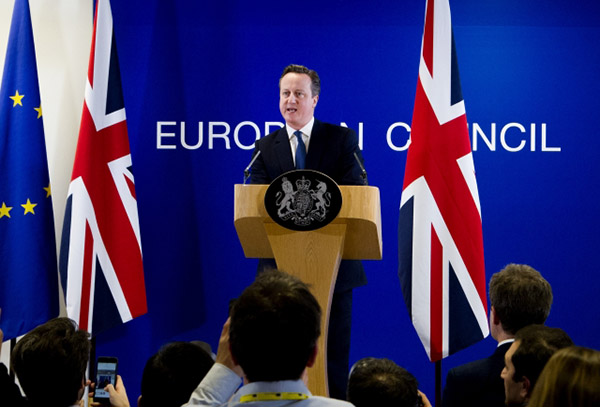
David Cameron emerged with his spoils. But also to some extent did we. He secured a special status in the EU. But he already had that, and things have scarcely changed. In the final analysis, like Monsieur Jourdain, he has done nothing but talk in European prose, although the British leader, unlike the character in Molière’s Le Bourgeois Gentilhomme, is aware of doing so even though he will not admit to it. The same applies to the European Council, despite the long and fraught negotiations, which sought to ensure that the EU does not start unravelling on this issue (although it is unravelling elsewhere).
In general, the concessions that Cameron has wrung from the European Council to try to dissuade British citizens from voting in favour of Brexit, the UK’s departure from the EU, change things little in reality. They effectively codify –if the British electorate votes to stay– what is already the case. ‘It is recognised that the United Kingdom, in the light of the specific situation it has under the Treaties, is not committed to further political integration into the European Union’.
A ‘privileged partnership’ is the way Jacques Delors, former head of the European Commission, termed it. But there are two dangers: first, that although the agreement applies only to the UK, other member states will use it as the precedent for initiating their own processes of disengaging from the EU. And secondly that it might prove to be futile and the British will end up leaving anyway. This is a scenario feared by the Franco-German axis, among others, which is why such efforts have been made to keep Cameron happy.
Although it may have a certain symbolic quality, the agreement reached at the latest European Council reflects the Europe that is already a reality. The reference to an ‘ever closer union among the peoples of Europe’ was enshrined in the Maastricht Treaty in 1992, and was negotiated on behalf of the UK by the then Prime Minister and fellow Tory, John Major. It was already clear then that it was open to different interpretations. For some it was a matter of advancing towards political union, while for others, like the British, it was not. At any event, some opinion polls suggest that of all the issues raised this is the one that least bothers British voters, if indeed they manage to penetrate Eurospeak, the jargon in which the agreement is couched, and if they are sensitive to issues other than the merely emotional or cultural. The role of the Britain’s Parliament (and of others) remains somewhat blurred. And the European Parliament will have its say and its vote on an agreement that will only come into effect if the British decide to remain.
The EU is already a variable-geometry union, which is not the same thing as having the ability to be a ‘half-member’ of the union. This is true in many respects, from Schengen to issues involving freedom, safety, justice and internal security. But the main division of our times is between the Eurozone (currently with 19 members) and the rest (including the UK). Ultimately, the grand accord consists of the UK remaining outside an ‘ever closer union’ in exchange for accepting an ever closer Eurozone. London has been given no right of veto with respect to progress in the Eurozone.
Formally acknowledging that the EU is a multi-currency union, even though that might be the reality, would undermine the principle that, except for those that already have an opt-out (the UK and Denmark; although not Sweden, whose entry into the euro is still in theory pending), other and future new members would be committed to entering the single currency. Nor does it make sense to grant the City of London, the true financial home of the euro, advantages that would not be applied to banks governed by the ever stricter rules of the Banking Union. Other countries would be able to request them, triggering the headlong flight of corporate HQs to such countries or to the City. London will take part in the decisions that affect it, for example on Banking Union issues, as is already the case, but will not be able to block them.
Lastly, there is the thorniest issue of all, which throws into question the free movement of workers subject to equal treatment: that of social benefits to immigrants from other EU countries and the emergency brakes’ to prevent them and their families receiving them in full during their first years of residence. Cameron wanted an opt-out of 13 years. They have given him four years, but only in exceptional cases and overseen by the Commission. It is true that some British benefits are not provided by other countries. It is also true that only 7% of recipients hail from the rest of the EU. But what has been agreed could set a precedent that, combined with the refugee issue, undermines the free movement of workers and people, a basic EU pillar that was extremely arduous to erect. Poland, which has the greatest interest in preserving these benefits, tried –not at the European Council table, but elsewhere– to give some ground on this point in exchange for more security through NATO. A bad trade-off. And once again the inability of the 28 to agree an efficient and honourable policy to manage the refugee issue –which will only get worse, not better– has been laid bare.
As for encouraging greater competitiveness, who could be against it? Rather than Monsieur Jourdain, it would be apt to recall, as I have before, Shakespeare’s Much Ado about Nothing or Lampedusa’s ‘everything needs to change, so everything can stay the same’, were it not for the fact that nothing has changed very much, and if in the end the British decide to leave –something that may ultimately occur, although there is a growing generation gap (older voters are more eurosceptic than their younger counterparts)– not everything will remain the same; far from it, both for the UK and for the others. But that is another story.


